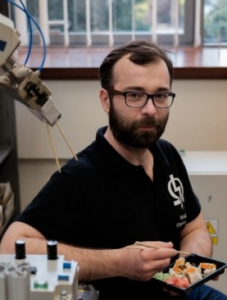Section EE (Power Engineering)
INVITED PAPER:
Transfer learning for fuzzy control of two-mass drive system using state variables feedback
Piotr Derugo
Wroclaw University of Science and Technology
Electrical Engineering Faculty, Dep. of Electrical Machines, Drives and Measurements
Wroclaw, Poland
Abstract:
This paper aims to present a novel approach to the fuzzy controller tuning process. The mentioned approach is somehow similar to transfer learning know-how in AI systems, it is based on the idea that some prior knowledge about the controlled system is usually in the possession of an engineer. General idea is to take a known control function for a simplified but similar control system and use it as a base for a more complex system, as it would better start than usual random weights and coefficients.
In this study, a classical PI controller with different feedbacks for a two-mass drive system is used as the source for the fuzzy controller with analogous feedback. By showing that regarding the mathematical complexity of finite bit precision computations, these planes are identical it would be proven that the fuzzy system is not worse than the classical, one and would be a great base for future improvements such as adaptivity. After the introduction, the MATLAB-Simulink model of the two-mass drive system is described, then the classical fuzzy controller, and the algorithm for control function reproduction of classical to the fuzzy controller.
Short Bio:

|
Piotr Derugo obtained his doctoral degree from the Łódź University of Technology (PL), Faculty of Electrical, Electronic, Computer, and Control Engineering in 2016. Currently is working at the Wrocław University of Science and Technology (PL) as an assistant professor teaching mainly electronics and industrial measurements for electrical engineers. By vocation preacher of quality didactics. Privately lover of decent food. Scientifically since always aficionado of neuro/fuzzy systems for electrical drives. Published around 40 papers in MDPI, Compel, Archives of Electrical Engineering, and others. |
